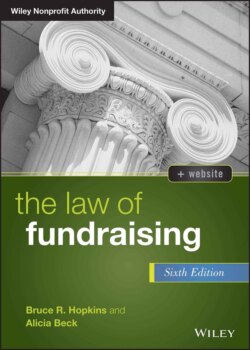Читать книгу The Law of Fundraising - Bruce R. Hopkins - Страница 22
§ 2.1 SCOPE OF TERM CHARITABLE ORGANIZATION
ОглавлениеThe many laws governing the process of soliciting gifts for charitable purposes principally apply, of course, to charitable organizations and those who raise funds for them. Thus, it is necessary to understand the scope of the term charitable organization as it is employed in these laws.
The term charitable organization as used in the state charitable solicitation acts has a meaning considerably broader than that traditionally employed under state law and under the federal tax law.2 Therefore, the soliciting organizations encompassed by the federal definition of what is charitable must comply with the requirements of federal regulation governing fundraising for charity as well as those of the various states (unless exempted). Some organizations, however, are tax exempt under federal law for reasons other than advancement of charitable purposes but are still obligated to comply with the panoply of state and local charitable solicitation laws.
The federal tax law definition of the term charitable is based on the English common law and charitable trust law precepts. The federal income tax regulations recognize this fact by stating that the term is used in its “generally accepted legal sense.”3 At the same time, court decisions continue to expand the concept of charity by introducing additional applications of the term.4 As one court observed, evolutions in the definition of the word charitable are “wrought by changes in moral and ethical precepts generally held, or by changes in relative values assigned to different and sometimes competing and even conflicting interests of society.”5
For the most part, the institutions and other organizations that are subject to these laws are those that have their federal tax status based on their classification as charitable organizations. These are the entities categorized as charitable, religious, educational, scientific, or literary, or certain organizations that are engaged in fostering national or international amateur sports competition.6 Each of these terms is defined in the federal tax law.
The term charitable in the federal income tax setting embraces a variety of purposes and activities. These include the relief of the poor and distressed or of the underprivileged,7 the advancement of religion,8 the advancement of education or science,9 the lessening of the burdens of government,10 community beautification and maintenance,11 the promotion of health,12 the promotion of social welfare,13 the promotion of environmental conservancy,14 the advancement of patriotism,15 the care of orphans,16 the maintenance of public confidence in the legal system,17 facilitating student and cultural exchanges,18 and the promotion and advancement of amateur sports.19
The federal tax law also encompasses organizations defined as charitable in the broadest sense;20 these include entities considered educational, religious, and scientific. Nonetheless, the term charitable as used in the federal tax context—including education,21 religion,22 and science23—is not as broad as the concept of tax exemption. Certainly, the term is not as far-ranging as the concept of nonprofit organizations. Stated another way, nonprofit organizations are not necessarily tax exempt, and tax-exempt organizations are not always charitable.
To be tax exempt under federal law, a nonprofit organization must satisfy the rules pertaining to at least one of the categories of tax-exempt organizations set forth in the Internal Revenue Code.24 In addition to those organizations that are recognized as charitable entities,25 the realm of tax-exempt organizations under federal law embraces social welfare (including advocacy) organizations,26 labor organizations,27 trade and professional associations,28 social clubs,29 fraternal organizations,30 veterans' organizations,31 and political organizations.32 Generally, with the exception of veterans' organizations,33 contributions to these organizations are not deductible as charitable gifts.34
In general, the sweep of the states' charitable solicitation acts is not so broad as to encompass all nonprofit organizations, nor is it so broad as to encompass all tax-exempt organizations. For example, these laws do not normally embrace trade and professional associations35 that are financially supported largely by dues (payments for services), rather than by contributions. Likewise, they do not normally cover private foundations,36 which, while charitable in nature, do not usually solicit contributions. By contrast, these laws are likely to be attributable to organizations (other than purely charitable ones) that are tax-exempt but cannot attract deductible contributions,37 or are eligible to receive deductible contributions but are not usually regarded as charitable organizations, such as veterans' groups.38
Generally, the organizations that need to be concerned with the state charitable solicitation laws are the following:
Churches and other membership and nonmembership religious organizations39
Educational institutions, including schools, colleges, and universities40
Hospitals and other forms of health care providers41
Publicly supported charitable organizations42
Social welfare organizations43
Consequently, an organization that is recognized as a charitable entity under federal tax law, and that engages in fundraising, is (unless specifically exempted)44 assuredly subject to the state charitable solicitation laws. These laws may, however, also encompass other types of tax-exempt organizations that solicit contributions.45
